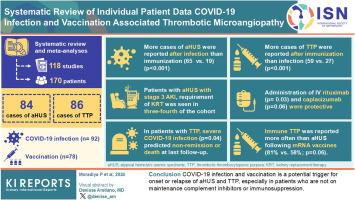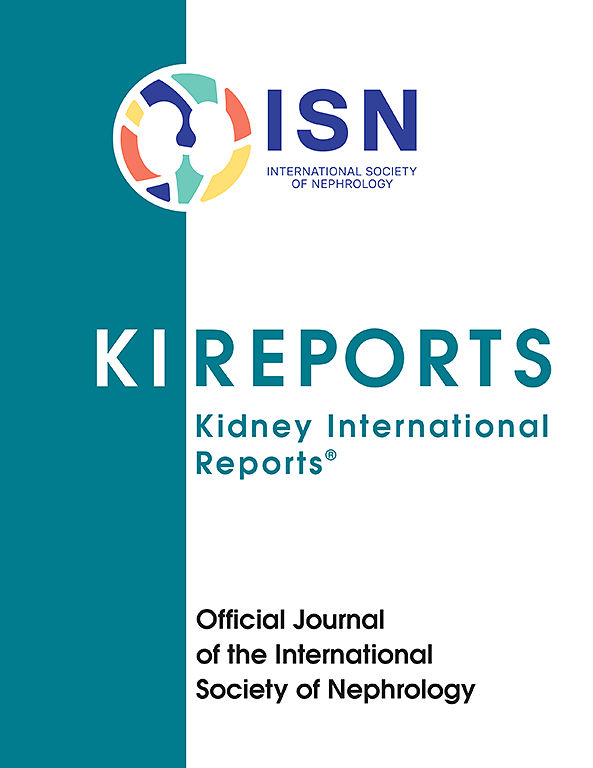Systematic Review of Individual Patient Data COVID-19 Infection and Vaccination–Associated Thrombotic Microangiopathy
IF 5.7
2区 医学
Q1 UROLOGY & NEPHROLOGY
引用次数: 0
Abstract
Introduction
Sporadic cases of atypical hemolytic uremic syndrome (aHUS) have been described in the literature in association with COVID-19 infection and vaccination in adults and pediatric patients. The exact mechanisms underlying COVID-19–associated thrombotic microangiopathies (TMAs) remain incompletely understood. Herein, we present a detailed meta-analysis of the clinical characteristics, outcomes, and management strategies of COVID-19–associated aHUS and thrombotic thrombocytopenic purpura (TTP).
Methods
This study was performed following the Preferred Reporting Items for Systematic Reviews and Meta-analyses updated guidelines. PubMed was utilized for searching for case reports and series. Adverse outcome at last follow-up was defined as estimated glomerular filtration rate < 30 ml/min per 1.73 m2 (patients with aHUS), no remission with therapy, or patient death. Data were analyzed using Wilcoxon rank and Chi-square tests.
Results
Our analysis cohort included 118 studies reporting on 170 patients. These included 84 cases of aHUS and 86 cases of TTP resulting from COVID-19 infection (n = 92) or vaccination (n = 78). Significantly more cases of aHUS were reported after infection (n = 65) than immunization (n = 19), compared to TTP, where the reverse was true (n = 27 and n = 59, respectively; P < 0.001). In patients with aHUS with stage 3 acute kidney injury (AKI), requirement of kidney replacement therapy (KRT) was seen in three-fourths of the cohort for a median of 15. In patients with TTP, severe COVID-19 infection (P = 0.04) predicted nonremission or death at last follow-up. Administration of i.v., rituximab and caplacizumab were protective (P = 0.03 and P = 0.06, respectively). Immune TTP (iTTP) was reported more often than HUS following mRNA vaccines (81% vs. 58%; P = 0.06).
Conclusion
COVID-19 infection and vaccination are a potential trigger for onset or relapse of aHUS and TTP, especially in patients who are not on maintenance complement inhibitors or immunosuppression.

个体患者数据的系统性回顾 COVID-19 感染和疫苗接种相关性血栓性微血管病
文献中描述了成人和儿童患者感染 COVID-19 和接种 COVID-19 疫苗后出现非典型溶血性尿毒症(aHUS)的零星病例。COVID-19相关的血栓性微血管病(TMAs)的确切机制仍不完全清楚。在此,我们对 COVID-19 相关性 aHUS 和血栓性血小板减少性紫癜(TTP)的临床特征、预后和管理策略进行了详细的荟萃分析。本研究遵循《系统综述和荟萃分析首选报告项目》(Preferred Reporting Items for Systematic Reviews and Meta-analyses)最新指南进行。利用 PubMed 搜索病例报告和系列研究。最后一次随访时的不良结局定义为估计肾小球滤过率< 30 ml/min per 1.73 m(aHUS 患者)、治疗无缓解或患者死亡。数据采用 Wilcoxon 秩检验和卡方检验进行分析。我们的分析队列包括 118 项研究,报告了 170 例患者。其中包括 84 例 aHUS 和 86 例由 COVID-19 感染(= 92 例)或疫苗接种(= 78 例)引起的 TTP。感染后的 aHUS 病例(= 65 例)明显多于免疫接种后的病例(= 19 例),而 TTP 病例则相反(分别为 = 27 例和 = 59 例;< 0.001)。在急性肾损伤(AKI)3期的aHUS患者中,四分之三的患者需要接受肾脏替代治疗(KRT),中位数为15天。在TTP患者中,严重的COVID-19感染(=0.04)预示着最后一次随访时将出现不缓解或死亡。静脉注射利妥昔单抗和卡普拉珠单抗具有保护作用(分别为0.03和0.06)。接种 mRNA 疫苗后,免疫性 TTP (iTTP) 的报告率高于 HUS(81% 对 58%; = 0.06)。COVID-19 感染和疫苗接种是 aHUS 和 TTP 发病或复发的潜在诱因,尤其是在未使用补体抑制剂或免疫抑制剂的患者中。
本文章由计算机程序翻译,如有差异,请以英文原文为准。
求助全文
约1分钟内获得全文
求助全文
来源期刊

Kidney International Reports
Medicine-Nephrology
CiteScore
7.70
自引率
3.30%
发文量
1578
审稿时长
8 weeks
期刊介绍:
Kidney International Reports, an official journal of the International Society of Nephrology, is a peer-reviewed, open access journal devoted to the publication of leading research and developments related to kidney disease. With the primary aim of contributing to improved care of patients with kidney disease, the journal will publish original clinical and select translational articles and educational content related to the pathogenesis, evaluation and management of acute and chronic kidney disease, end stage renal disease (including transplantation), acid-base, fluid and electrolyte disturbances and hypertension. Of particular interest are submissions related to clinical trials, epidemiology, systematic reviews (including meta-analyses) and outcomes research. The journal will also provide a platform for wider dissemination of national and regional guidelines as well as consensus meeting reports.
 求助内容:
求助内容: 应助结果提醒方式:
应助结果提醒方式:


